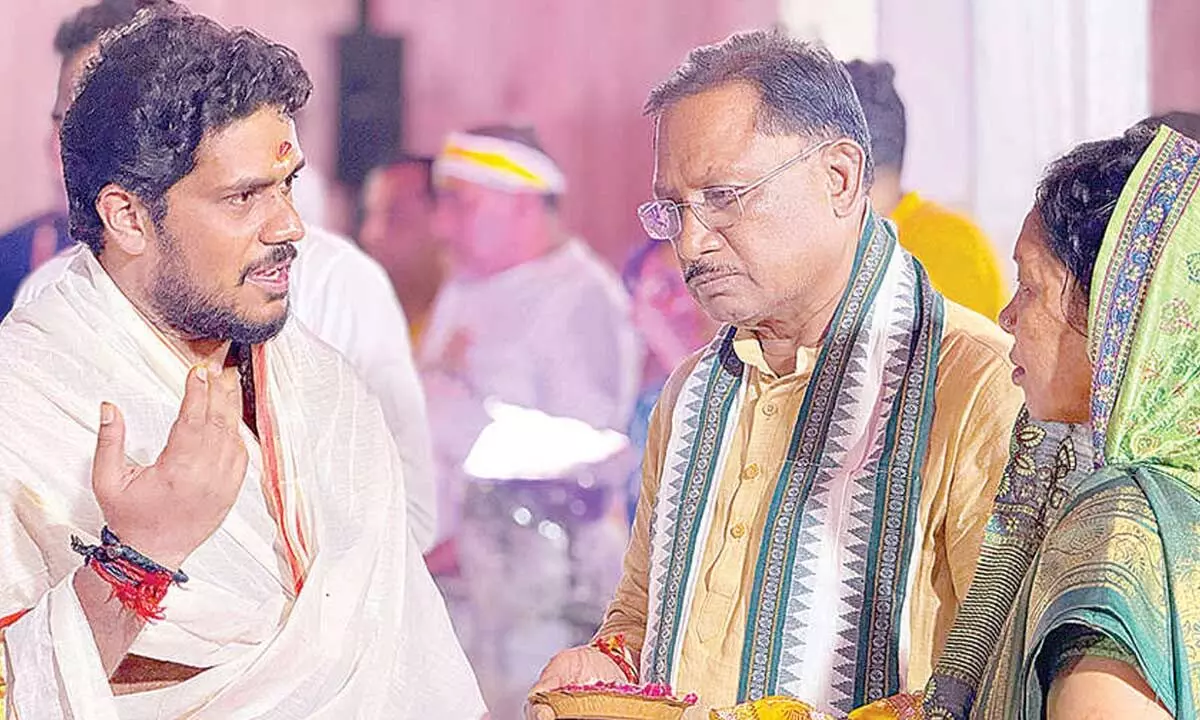Live
- They always want me to win, and now I feel lucky to have been offered a story like ‘Zebra’: Satyadev Kancharana
- ‘Democracy first, humanity first’: PM Modi in Guyana's parliament on two countries' similarities
- PKL Season 11: Telugu Titans register third straight win to top standings
- Is Pollution Contributing to Your COPD?
- NASA Unveils Underwater Robots for Exploring Jupiter's Moons
- Additional Central forces arrive in violence-hit Manipur
- AR Rahman and Saira Banu’s Divorce: Legal Insights into Common Issues in Bollywood Marriages
- 82.7 pc work completed in HPCL Rajasthan Refinery area: official
- Curfew relaxation extended in 5 Manipur districts on Friday
- Tab scam prompts Bengal govt to adopt caution over fund disbursement
Just In
Reviving Vedic traditions with Maha Yagnams


Insights from Maha Suhruta Maha Shakta Yagnam in Dandakaranya
Raipur recently played host to a spectacular convergence of spirituality and tradition as the Sri Maha Divya Desham Foundation organised a five-day Maha Suhruta Maha Shakta Yagnam from May 19th to 23rd. The event, held at the historic Shadani Darbar Tirth, a sanctuary with a 300-year legacy linked to Lord Shiva, was a grand celebration of Vedic rituals and cosmic harmony.
The foundation works with a vision to support temple priests, artists, artisans and sculptures has organised Mahayagnam which is performed for the first time in this yuga.
The yagnam featured an array of intricate homams and poojas, each performed with meticulous adherence to ancient procedures. Highlights included the Maha Sudarshana Homam, Maha Dhanvantari, Maha Aghora, and Maha Bhadrakali Trishtuppu, among others.
These rituals, carried out by a dedicated team of 12 Namboorthiris, Thantris, Shivacharyas, and Mel Shantis, aimed to cleanse the body, balance energies, and uplift the spirit. The participation of these revered priests underscored the deep roots and continued relevance of these practices, preserved through the Gurushishya Parampara by 64 families.
A particularly enchanting aspect of the event was an Odissi performance choreographed by Guru Bichitrananda Swain, which beautifully depicted the Mahamaya of Mahadevi. This was complemented by the vibrant Pancha Vadyam performance by Chottanikkara Satyan Marar and his team, designed to stimulate the five senses and elevate the presence of the divine.
The yagnashala, or ceremonial fire pit, was a masterpiece of symbolic architecture. Designed as an open-air pavilion, its central fire pit represented Agni, the Vedic god of fire. The orientation of the structure, often aligned with cardinal directions or astronomical markers, was intended to harness cosmic energies, creating a sacred space for spiritual communion.
Integral to the rituals were intricate tantra symbols, such as the Sri Yantra and Ganesh Yantra, which invokes specific divine energies. These symbols, along with sacred mantras, created a potent synergy that amplifies the rituals’ effectiveness. Mandala designs, symbolizing the universe, are also prominent, guiding the spiritual journey of the participants.
The yagnam drew an enthusiastic response from the youth, with 400 to 500 young volunteers actively participating. Their contributions ranged from organising materials and decorating the venue to distributing prasadam and assisting the priests. This infusion of youthful energy not only ensured the smooth conduct of the yagnam but also highlighted the enduring appeal of these ancient practices.
The presence of Chhattisgarh’s Chief Minister among the attendees underscored the event’s significance, drawing together people from all walks of life. This inclusive spirit is a hallmark of yagna, fostering social cohesion and reinforcing a collective identity. The yagna’s impact extended beyond spiritual enrichment; it also supported local communities, with materials sourced directly from farmers in the Western Ghats.
This Maha Suhruta Maha Shakta Yagnam was more than a series of rituals; it was a vibrant tapestry of cultural heritage, spiritual devotion, and community spirit. It served as a powerful reminder of the timeless relevance of Vedic traditions and their role in promoting cosmic harmony and societal welfare. Sri Rajiv Rakul Maharaj, Founder of Sri Maha Diya Desham Foundation has said that “ first time Devi’s five heads representing five Shaktis are invoked during these five days including the avahana of Guhya Yogini Devis”.
Overall, the Maha Suhruta Maha Shakta Yagnam organised by the Sri Maha Divya Desham Foundation was a significant event that showcased the ancient rituals and practices of Yagna. It emphasised the importance of spiritual evolution, social cohesion, and cosmic harmony. The event provided a platform for the exchange of knowledge, resources, and goodwill, reinforcing the interdependence and welfare of society. The architecture of the yagnashala embodied the sacred principles of Hindu cosmology and ritual practice, creating a space for devotees to connect with the divine and experience spiritual transformation. There is an immediate need to skill and safeguard these sacred rituals in its purest form for future generation as mentioned by the Founder of the organisation.

© 2024 Hyderabad Media House Limited/The Hans India. All rights reserved. Powered by hocalwire.com






